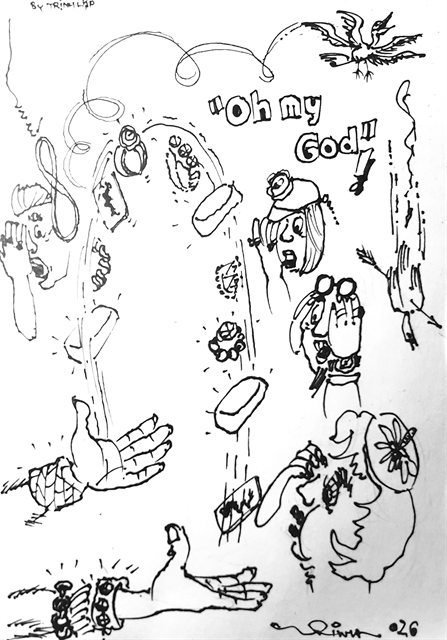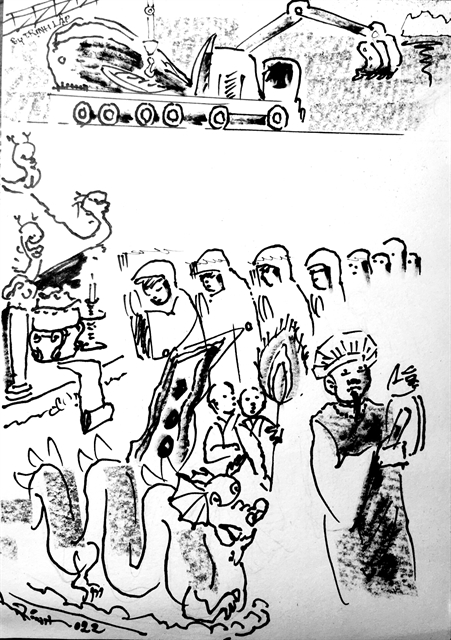 Talk Around Town
Talk Around Town

 |
| Illustration by Trịnh Lập |
by Nguyễn Mỹ Hà
Whales have always been fishermen's saviours and best sea-faring companions, according to the legends of fishing villages scattered from north to south Việt Nam.
In recent history, we could only see them being washed ashore. Locals would rush to bury them, offer incense and fresh flowers, enacting funerals for them like loved ones who had passed away.
But over the past few weeks, the country has been rocked with beautiful pictures and video clips that captured a mother and child pair of Bryde's whales surfing the waters off Đề Gi shore, 50km north of Quy Nhơn City in Bình Định Province.
For the first time, people here could see whales swimming in the blue waters of a remote town Đề Gi, which was rarely heard of before.
On the one hand, people who love to see nature jumped at the occasion to see the mother whale and her child spray water, catch a mouthful of small fish and swim gracefully.
On the other hand, environmentalists and nature conservationists called to protect the giant mammals, not to be hunted down for food or trapped in fishing nets.
The Bryde's whale is categorised at Level V in Việt Nam's Ministry of Agriculture and Rural Development list of protected endangered marine species: forbidden to fish or harm.
Bryde's whales belong to the baleen whale family, which is protected in Việt Nam and the United States.
The Bryde's whales are considered one of the "great whales", a group that includes blue whales and humpback whales, and named after Johan Bryde, a South African shipping company owner and whaler of Norwegian ancestry, who built the first whaling stations in South Africa in the early 20th century.
Recognised by their three parallel ridges in front of their blowhole, Bryde's whales usually prefer warm oceans of 16 degrees Celsius, such as the Atlantic, Indian and Pacific oceans.
Some populations of Bryde's whales make short migratory movements with the seasons, while others do not migrate, making them unique among other migrating baleen whales.
They are vulnerable to many factors and threats such as vessel collisions, ocean noises and whaling activities.
Việt Nam has a more than 3,000km-long coastline and a tradition of fishing, but it's not our tradition to hunt whales.
Quite the opposite, whales are considered sacred animals that help and usher fishermen in distress to shore.
Solemnly dubbed and revered as "Cá Ông", literally translated as "Gentleman Fish" or "Grandfather Fish", whales have been worshipped in the fishing community along the coasts for centuries.
From Thanh Hóa Province toward the southern end, it's a local belief to worship whales and dolphins. People believe whales are the incarnation of the South Sea God, decreed by the royal court as the Human Fish, worshipped with other village patron saints who helped and saved people.
Originating from the Chăm people who worshipped Poriak God, the Sea God, this belief is a custom of both the Vietnamese and Chinese people.
All fishing villages in the centre and south of Việt Nam have a temple dedicated to the Great Whale, representing the South Sea God, who shows up to help anglers when they have to weather big waves and strong winds, bringing them to safety.
The whale skeleton saved in Phan Thiết City, Bình Thuận Province, is the largest set of remains in Việt Nam and Southeast Asia at 22m long and weighing 65 tonnes.
A local custom goes that anyone who discovers a perished whale has the responsibility to bury and mourn him as he would his parents. The carcass is buried under sand by the seashore, and during the Nguyễn Dynasty, that man would be waived from state duties for three years.
Fishing villages believe that any village that has the honour of burying a deceased whale will be prosperous for generations to come. Three or four years after burying the whale, villagers have to re-bury the ocean beast. A ritual during spring or early summer is carried out to dig up the bones, wash them with alcohol, put them in an urn to join other village gods to be worshipped in the local temple.
Fishermen who died at sea are also prayed for, alongside Great Whale worshipping. Such a ritual is followed by a series of joyous festivities like singing, boat racing and folk dramas.
In Đà Nẵng, the ritual takes place in the third lunar month every year, and a grand ritual takes place once every three years, whereas in Bến Tre Province in the south, the Whale Welcoming ritual takes place in the sixth lunar month.
Every time a fishing boat rushes out to sea, you can be sure fishermen on it prays to get help from the Great Whale.
According to the US Department of Commerce, there are at most 135 Bryde's whales worldwide, with under 100 living off the Gulf of Mexico.
For the mother-and-child Bryde's whales who rocked the sea off Đề Gi town over the past few days, the local government will enforce protection to keep them from danger, such as the whale watching boats that go in too close to film and photograph them.
If it's the fortune for generations to come to receive a shore-perished whale, then it must be our responsibility to protect them when they visit or come and enjoy the great schools of sardines that have come to the shore off Quy Nhơn beach this year. VNS




